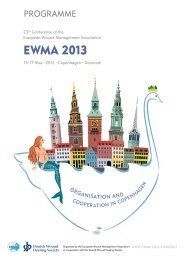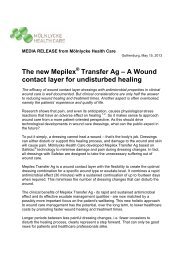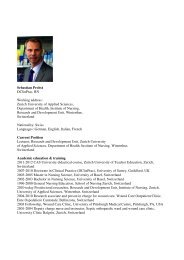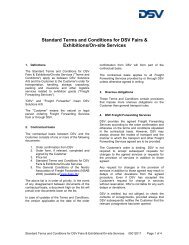Create successful ePaper yourself
Turn your PDF publications into a flip-book with our unique Google optimized e-Paper software.
E-POSTER: HEALTH ECONOMICS & OUTCOME<br />
E-Poster: Health Economics & Outcome<br />
EP 502<br />
EVALUATION OF THE USE OF A POINT OF CARE TEST FOR PROTEASES TO<br />
IDENTIFY PATIENTS WITH INCREASED RISK OF SKIN GRAFT FAILURE<br />
Franck Duteille 1<br />
1 Service des Brulés CHU Nantes (Nantes, France).<br />
Aims: In chronic wounds, proteolytic environment persists, degrading proteins of the<br />
extracellular matrix. A new point of care diagnostic test for elevated protease activity<br />
(EPA)* is now available. According to a recently published study, EPA is associated with<br />
a 90% probability of non-healing. This study was designed to evaluate the value of this<br />
test to identify chronic wounds with an increased risk of graft failure.<br />
Methods: The study aims to recruit 30 chronic wounds, of which the quality of the bed<br />
of the wound is considered by one senior surgeon of the team good enough to perform a<br />
skin graft. All the wounds are assessed using the new protease test in the operating<br />
room before the graft procedure is performed. All receive a meshed dermo-epidermal<br />
thin graft with standard follow up treatment. Of the wounds, the ones with EPA are<br />
assigned to group 1 and the ones with low protease activity to group 2. The percentage<br />
graft ‘take rate’ is recorded by the same surgeon at Day 3 and 8 using standard criteria.<br />
Results: For the 20 wounds which have been followed up to date, the success rate was<br />
0% (0/3) in group 1 and 94% (16/17) in group 2.<br />
Conclusions: We can conclude that the protease test evaluated is a very interesting<br />
predictive and objective test to help the surgeon in his decision whether or not to carry<br />
out a graft procedure, which is very interesting from both a clinical and economical point<br />
of view.<br />
*WOUNDCHEK Protease Status<br />
EP 503<br />
E-Poster: Health Economics & Outcome<br />
QUANTIFYING THE ECONOMIC VALUE OF DIAGNOSTICS IN WOUND CARE IN<br />
THE UK<br />
Louise Digby 1 , Paolo Di Vincenzo 1 , Jane Clark 1 , Chris Gilpin 1 , Leo Nherera 1<br />
1 Systagenix (Gatwick, United Kingdom).<br />
Aim: Chronic wounds present a significant financial and resource burden to the NHS.<br />
The annual cost of wound care in the UK has been estimated to be £2 million per<br />
100,000 population. A recent study found that 28% of all non-healing chronic wounds<br />
had EPA (elevated protease activity), which can now be assessed using a new point of<br />
care protease test*, and that these wounds had only a 10% chance of healing without<br />
appropriate intervention. A separate study showed that 77% of venous leg ulcers<br />
responded to Collagen/ORC therapies, when targeted to wounds with EPA. This work<br />
aimed to quantify the economic value of testing for EPA and targeting treatment<br />
accordingly.<br />
Methods: An economic model was developed to calculate the potential saving that could<br />
be achieved by identifying chronic wounds with EPA and targeting protease modulating<br />
treatment** accordingly. Published effectiveness data and UK relevant resource use data<br />
were used to populate the model.<br />
Results: The model estimated potential savings of £1,906 per EPA wound identified<br />
when compared to usual care. This equates to over £50,000 for every 100 non-healing<br />
chronic wounds tested.<br />
Conclusions: The model demonstrates that implementing a ‘test and treat’ algorithm of<br />
care in the UK involving testing for EPA and targeting protease modulating treatment<br />
accordingly can achieve savings while dramatically improving the healing chances of<br />
EPA wounds, thus confirming previously published consensus opinion on this topic.<br />
*WOUNDCHEK Protease Status<br />
**PROMOGRAN ® / PROMOGRAN PRISMA ®<br />
<strong>EWMA</strong> <strong>2013</strong><br />
COPENHAGEN<br />
15-17 May · <strong>2013</strong><br />
Danish Wound<br />
Healing Society<br />
287






